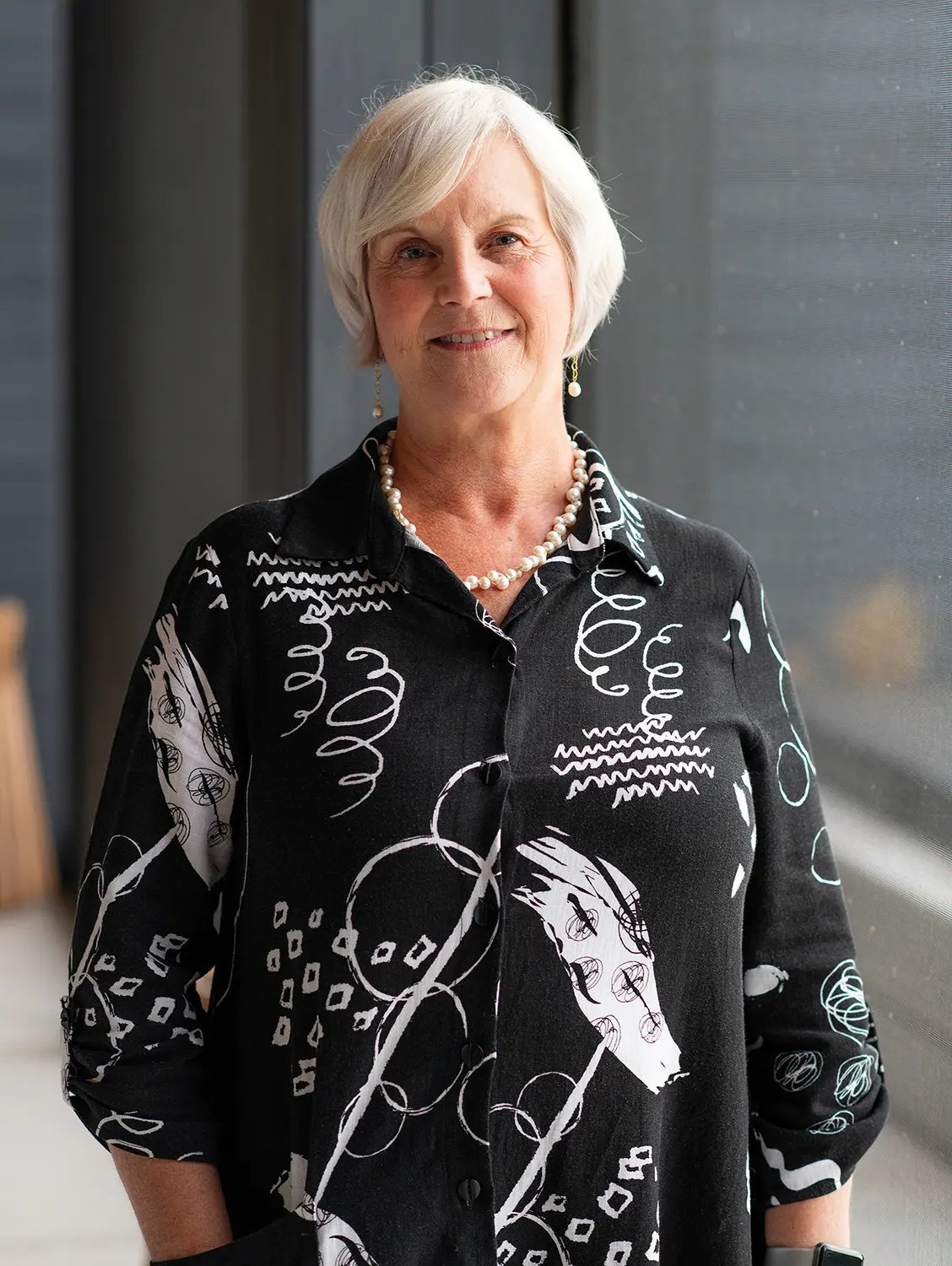
On The Bay speaks with Jory Pritchard-Kerr about her more than three-decade commitment to raising tens of millions of dollars to create and equip a first-class hospital in small-town Collingwood.
By Dianne Rinehart // Photo by Jessica Crandlemire
Jory Pritchard-Kerr is the president and CEO of the Collingwood General and Marine Hospital Foundation and the former chair of the board of directors at the Association for Healthcare Philanthropy. In 2022, Jory Pritchard-Kerr received the prestigious Harold J. (Si) Seymour Award from the Association for Healthcare Philanthropy for a career that reflected excellence and outstanding leadership. Now, before she retires, the woman who moved to Collingwood for the love of her husband-to-be, and raised her family of three sons and six grandchildren in the town she loves, is about to embark on the biggest challenge of her career: raising $100 million with her team at the Foundation to build “the hospital of tomorrow.”
Dianne Rinehart: Welcome to On The Bay magazine, Jory. What was it that originally attracted you to Collingwood?
Jory Pritchard-Kerr: Originally, I came to Collingwood to be with my soon-to-be husband, Doug Kerr. I left Mississauga and came up here because it was such a lovely town and had a lot of opportunities for me to work in the field I’d been trained in, which was recreation and business.
DR: What was your very first job in town and where did you go from there?
JPK: My first job was working at what was then Cranberry Resort as the receptionist in the condo sales office as a summer job. Then, after I graduated with an honours BA in recreation administration, I took a
position as the recreation director at Cranberry.
DR: What was the first big fundraising exercise you worked on? How did that influence the trajectory of your career?
JPK: It was a capital campaign to build the first YMCA in Collingwood. I came into that because I had done a market analysis to build a YMCA here as my thesis in university. So, I knew a lot about the Y. I was there for five years. I went through the campaign to raise the money and then went through the build, and after the building opened, I was there for another two years. I learned the art and science of raising money. We raised $2.3 million, in a small community.
DR: Is raising money in a small community different than in a larger city.
JPK: Yes. We don’t have a lot of industry and head offices you can go to to raise money. It’s very much raising money with individuals in the community. It’s a lot about relationship-building and building trust that you will deliver on your promises.
DR: You’ve been at the helm of the Collingwood General and Marine Hospital Foundation since 1986. Can you describe how the foundation’s role has evolved in that time based on changes in government funding?
JPK: When I first came to this position, it was a very different health care environment in Ontario. You weren’t supposed to run an operating deficit at the hospital. But you just did it and begged forgiveness and most times the ministry would send a cheque and make the hospital whole again. Now the ministry’s budgets are tight, and you have to ensure that you’re working towards a balanced budget at all times. So, for the last 25 years we have been fully dependent on community support to purchase equipment and technology and renovate facilities.
DR: Your hospital serves Collingwood, The Blue Mountains, Wasaga Beach, Clearview, and parts of Grey Highlands—plus all of the weekenders. How does that affect fundraising?
JPK: Our fundraising campaigns have to compete with the things that hospitals in Toronto, such as Sunnybrook and Sick Kids, are doing because we’re sharing the same donors, in the weekend market. We have to be a bit cheeky in our fundraising campaigns to get their attention. While weekenders are here, Collingwood is their hospital, because in many instances you don’t have the luxury to drive back to whatever hospital you usually frequent. You have to be confident we can look after you here.
DR: Over the years what has proven to be your most important skill?
JPK: I think it’s my commitment to teamwork. To making sure that we succeed as a team, that we learn as a team, and that everybody has input into what we’re doing.
DR: It must be difficult to fundraise for some of the “not so sexy” equipment and technologies in this hospital. How do you go about getting those conversations started?
JPK: What’s important is to build the trust in the community that the money will go to the places where it’s most needed to deliver excellent patient care. Once you build the trust in the community that you’re going to deliver on what you say, it becomes a little easier to raise money for those types of priorities. We did a campaign a few years ago. The physicians came and said they needed $3 million to build out an electronic medical record. So, for example, if your physician is a member of the family health team, the physician in the emergency room can go directly into their records to find out what kind of medications you’re on if you can’t answer questions or give information. We were the first hospital to be able to do that.
DR: Have you had any personal experiences that gave your job special meaning or purpose?
JPK: In 2005, we had been raising money for a system that takes diagnostic images and makes them electronic so they can be securely accessed by specialists in other centres. Basically, I thought it’s a great big computer sitting in Barrie somewhere, and I don’t understand what this is about but radiologists tell me it’s important and we need it. We finished the campaign and had a celebration on the Friday with all the generous donors. On Saturday night, my oldest son suffered a brain injury. I found myself with him and my husband in the CT scan suite. We were using the new technology. At 3 a.m., someone, I don’t know where, was reading his brain scan and they found these two bleeds on his brain. He was sent to Toronto Western where they operated on him. And I thought about that so much while he was recuperating: What if we hadn’t had that technology? It’s a very easy injury to miss and he might have died.
DR: In your experience, what motivates people to be philanthropic in the community?
JPK: Some people are looking for recognition. But what I find with the donors we work with here, is that they’re looking to make sure that the community they live in is the best it can be. They are motivated to help us reach another level of health care. When new people in the community come and they look at the outside of the building, they’re afraid to come in because they think it’s a rinky-dink cottage hospital. But when you come in here and you are cared for by the professional staff that we have, and when you hear about the background of some of our physicians and the awards they’ve won and the leadership they show across Canada, you really get a different feeling for it.
DR: There are a number of charitable foundations in the region all competing for donations. How do you balance the hospital’s need with other vital community initiatives?
JPK: I firmly believe that when we all work together to raise the standards for fundraising in the community, everyone benefits. But more importantly, the hospital is very dependent on these other charities. If we don’t have a hospice, we can’t get people who are in an acute care bed out to a more appropriate facility. If we didn’t have My Friend’s House [a shelter for women facing intimate partner violence and their children] and Home Horizons [a shelter for homeless youth] and those other charities, we would have many cases where their clients would be in our emergency department.
DR: Can you tell us about your work with the Association for Healthcare Philanthropy? Do you get any ideas from your interaction with professionals at other hospitals?
JPK: It’s an organization really based on expanding the knowledge and expertise of philanthropic professionals. Being on the board gave me the opportunity to meet people who were running much, much larger organizations. The more people you meet, the more you can share and learn.
DR: As you approach retirement—that is, if the foundation ever lets you—you will be launching one of the largest fundraising efforts ever. The cost of the new hospital has ballooned to $1 billion, and the local share is $100 million. Can you tell us about that effort and what it will mean for your beloved community?
JPK: It’s been our big baby for a while. It’s the largest campaign in this community. Basically, in 2019 we went to people who were our donors and people who were not our donors and asked them: Do you see a new hospital as a priority? And the feedback was very positive. This new hospital will allow the people who work here the freedom to have the facilities they really need to be able to deliver exceptional care. In the community it will mean they have the hospital of tomorrow that will meet their needs for generations to come.











